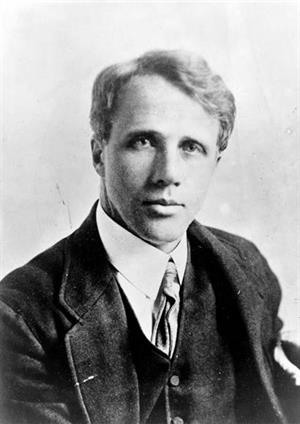PDF chapter test TRY NOW
Name of the poet: Robert Frost
Name of the poem: "Dust of Snow"

**Robert Frost
Robert Frost was an American poet. He was born in San Francisco on March26, 1874, to parents William Prescott Frost Jr. and Isabelle Moodie. His parents had relocated from Pennsylvania shortly after marrying. Later, when Frost was 11 years old, his father died of tuberculosis, and the family (consisting of his mother, two-year-younger sister, Jeanie, and himself) moved to Lawrence, Massachusetts. During his high school years in Lawrence, he grew interested in reading and composing poetry, and in 1892, he enrolled at Dartmouth Academic in Hanover, New Hampshire, and then at Harvard University in Boston. Despite him attending universities, he never earned a formal college degree.
His first published poem, "My Butterfly," appeared on November 8, 1894, in the New York newspaper The Independent. In 1895, he married Elinor Miriam White, who was a major inspiration for his poetry until her death in 1938. The family moved to England in 1912, which turned out to be a turning point in his life as a poet. His first book of poetry, A Boy's Will, was published the next year. He also made some important acquaintances, including Edward Thomas (Frost's inspiration for "The Road Not Taken"), Rupert Brooke, T. E. Hulme, Robert Graves, and Ezra Pound. In 1914, his second volume of poems, North of Boston was published. By the time Frost returned to the United States in 1915, his reputation was established, and by the 1920s, he was the most celebrated poet in America.
Frost was known for his accurate descriptions of rural life and grasp of American colloquial speech. He frequently wrote about rural settings in early twentieth-centuryNew England, utilising them to explore difficult social and philosophical subjects. He is also the only poet to have received four Pulitzer Prizes for Poetry, and was frequently honoured during his lifetime. He was nominated for the Nobel Prize in Literature 31 times, received the Congressional Gold Medal in 1960, was named Poet Laureate of Vermont on July 22, 1961, and won the Bollingen Prize in 1963.
Some of his poetry collections are,
- A Boy’s Will, 1913
- North of Boston, 1914
- Mountain Interval, 1916
- New Hampshire, 1923 (Won the 1924 Pulitzer Prize; contains the poem "Dust of Snow" and "Fire and Ice")
- West-Running Brook, 1928
- Collected Poems of Robert Frost, 1930 (Won the 1931 Pulitzer Prize)
- A Further Range, 1936 (Won the 1937 Pulitzer Prize)
- A Witness Tree, 1942 (Won the 1943 Pulitzer Prize)
- In the Clearing, 1962
Frost died in Boston on January 29, 1963, aged 88, of complications from prostate surgery. He was buried at the Old Bennington Cemetery in Bennington, Vermont. His epitaph quotes the last line from his poem, "The Lesson for Today" (1942): "I had a lover's quarrel with the world."
